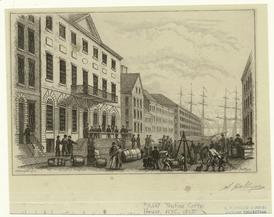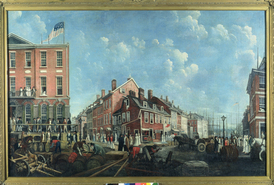Tontine Coffeehouse
Across from the Meal Market, where enslaved workers could be hired or bought, was the Tontine Coffee House, home of the New York Stock Exchange. Powerbrokers of the day met in a room there to buy, sell, and trade. As soon as a ship’s captain reached the harbor, this is where he came to register his cargo. The goods coming into New York in the 1790s included coffee, tea, sugar and molasses, fine furniture, cloth, cotton, and enslaved men, women, and children.
The companies that insured, outfitted, and owned the boats used to carry Africans from their homelands to enslavement often traded on the stock market. The slave trade was big business and New Yorkers made huge profits from it long after slavery was made illegal in the state. The first and last New York slave trader to be executed was caught in April 1861, as the first shots of the Civil War were fired.
The New York Stock Exchange has roots that go back to a spring day in 1792, when a group of 24 men met outside 68 Wall Street in the shade of a huge sycamore tree that locals called a buttonwood. They set down the rules they would trade by and called it the Buttonwood Agreement. Later that year, trading moved into a room on the second floor of the Tontine Coffee House, where it remained until 1817. In the words of its president, it was a place “filled with underwriters, brokers, merchants, traders, and politicians; selling, purchasing, trafficking, or insuring; some reading, others eagerly inquiring the news…Everything was in motion; all was life, bustle and activity." It was also a place built on slavery.
This entry contributed by
Curriculum Concepts International
Related Media
Images

|
In the 1790s, the Tontine Coffee House was only one block from the East River. By 1820, it was 2 blocks from the river as landfill widened Manhattan Island.
|

|
In 1792, the New York Stock Exchange was located in the Tontine Coffee House at 82 Wall Street. Slave ships were registered here and a value was assigned to the Africans on board.
|

|
This engraving of Tontine Coffee House offers a view from 1820.
|

